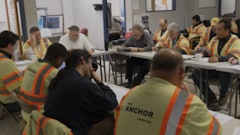It wasn't too long ago that communication tools in construction were limited to a two-way radio, or a roll of quarters and the nearest pay phone. Today, there are many programs and devices that connect us, but the quality of communication is often poor - and that's bad news for the future success of your firm.
Cell phones are the biggest culprit. Everybody has one, and when we need information, we immediately make the call. For employees performing in a supervisory role this ability to make the call creates two problems.
The new supervisor doesn't know everything that needs to be done. He's inexperienced; we understand that. However, with cell phones, he doesn't need to make a decision; all he has to do is put in a quick call to the boss and get the answer. Years ago, new foremen and superintendents weren't able to "call for help," so they learned how to innovate on the job. They learned how to make decisions. In short, they learned how to think. Today, we are building a crop of supervisors who don't know how to think. Why take a chance on making a wrong decision when they can snap a digital photo and send it back to the office? I'm not saying sending the photo is a bad thing. I am saying that abdicating responsibility and learning how not to think is dangerous for your emerging supervision - and for your company.
The senior supervisor who now oversees several sites loves to make the call. He has the ability to reach out and talk with all the new, unsure supervisors. In fact, he encourages them to "just call me if you have any questions." This sounds helpful but, by doing so, he's actually training them not to think for themselves. When he retires, there will be an entire crop of supervisors who don't know how to handle personnel issues or solve problems on-site.
Have you ever overheard one of those point-to-point Nextel conversations? They are often mindless and rambling, because the caller wasn't properly prepared before he made the call. This causes incomplete conversations and call-backs, all of which reduce productivity. Back in the days of two-way radios, the kind where everyone was on the same frequency, the person making the radio call thought long and hard before he acted. He had to decide if he really wanted to let everyone else in the company hear what problems he was dealing with. And if he did decide to make the call, he had been trained to write down what he was going to say--and practice it once--before he ever pressed that push-to-talk button. I learned this technique in the Marines. It's efficient, doesn't waste time, and a great by-product of airing out issues on the radio net was that, because everyone did hear the problems you were facing, the team could often find solutions.
In my consulting work, I consistently see a firm's communication as the area most in need of improvement. This isn't just my assessment; it's what the employees tell me. Recognizing that your business's communication could probably stand improvement, I encourage you to think about the tools you are using and how they are helping or hurting your business. Do more of what works, and phase out what hurts. Your future depends on it.



















